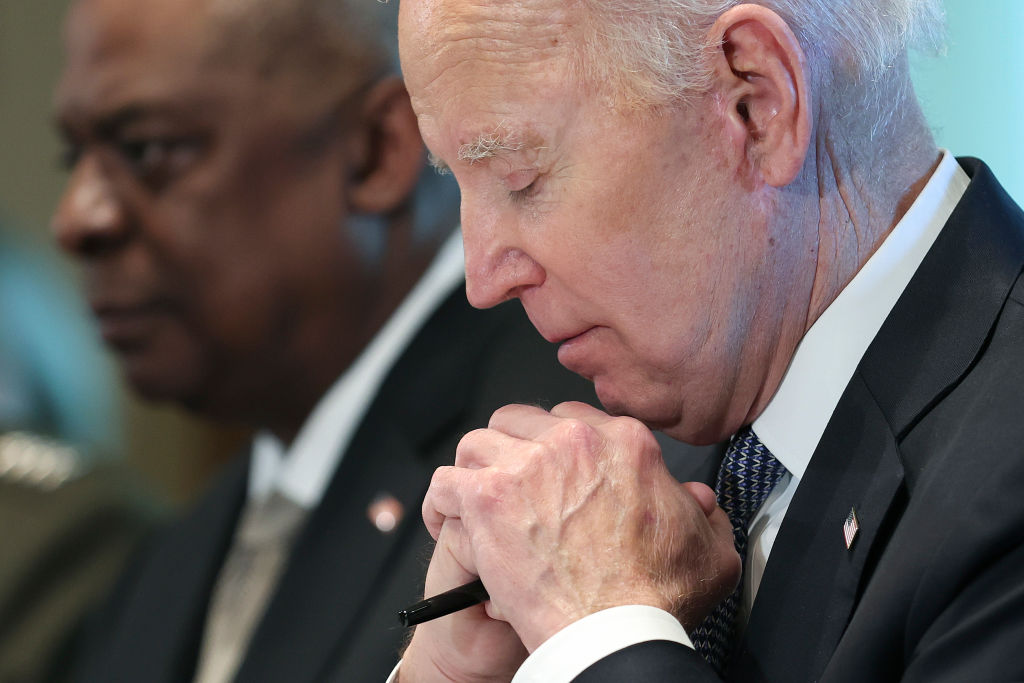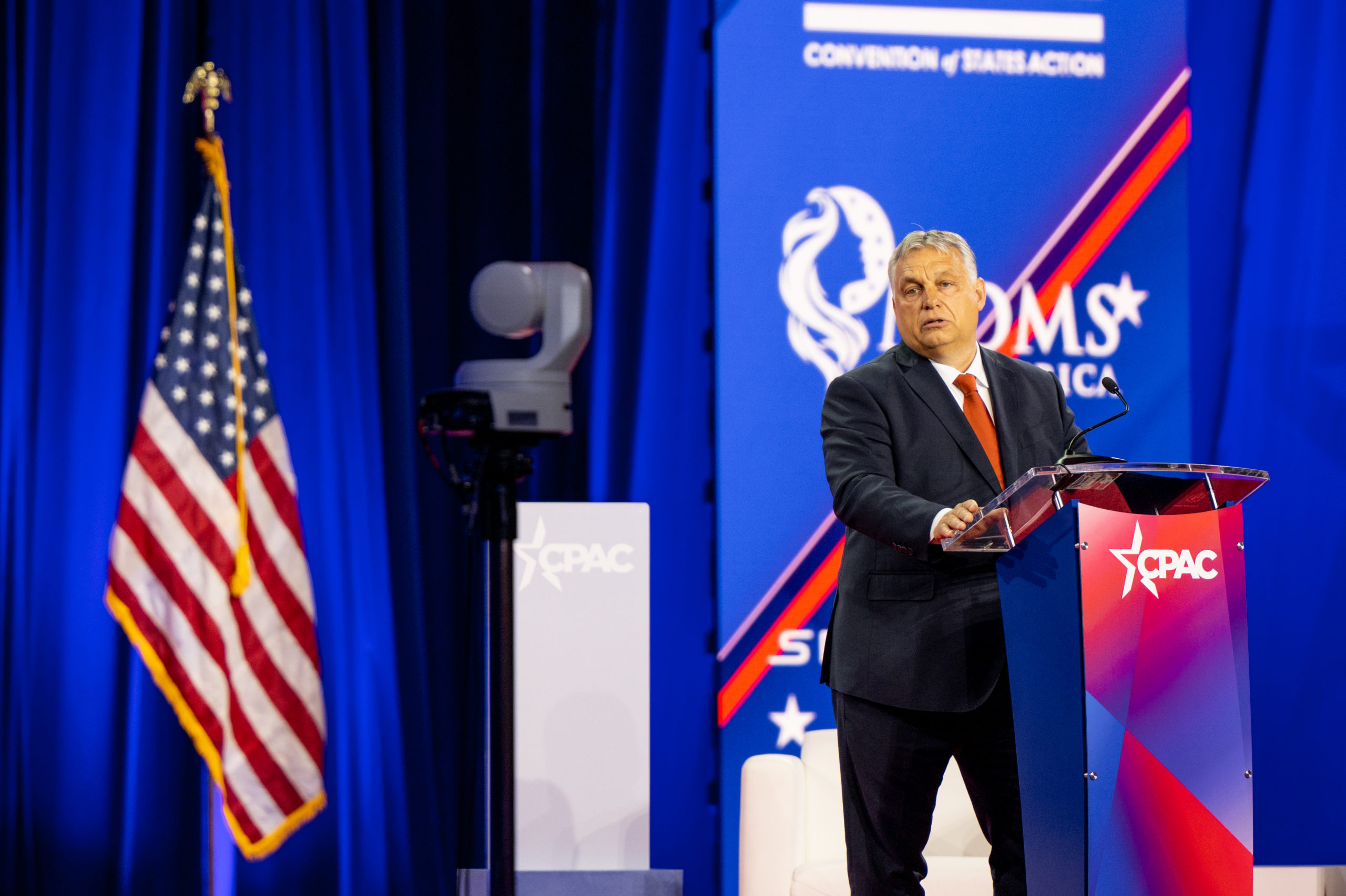The Anglo-American alternative to fascism, Marxism, and enlightenment rationalism.
Biden’s America Adrift

The administration threatens to use U.S. power globally to advance its progressive agenda.
The Biden Administration’s new 2022 National Security Strategy (NSS) isn’t completely wrong—just mostly. It captures President Biden’s usual tone, ranging from angry saber-rattling to confusion and fear, as the administration gratuitously apologizes for America’s shortcomings, and hews closely to its domestic progressive agenda. The NSS speaks big, employing harsh language to threaten the use of U.S. power, including military force, to impose the administration’s world view. But, by the end, Biden carries a very soft stick, announcing an end to U.S. leadership and the importance of a good HR department.
The NSS declares that the administration has “broken down the dividing line between foreign policy and domestic policy” for its priorities of diversity, equity, and inclusion (DEI), and climate change, which it refers to as the “greatest and potentially existential” shared problem confronting the world. The NSS mentions climate or climate change at least 63 times, clean energy, air or water another 19 times; and DEI, or its components, 37 times. To bring these values to the world and “uphold the rights of all Americans,” the NSS pugnaciously proclaims that “we must proactively shape the international order in line with our interests and values,” and be prepared to use all of America’s power to “center” equity and inclusion, reduce fossil fuels, and promote the green agenda.
The administration’s positions are irreconcilable, or at least insufficiently introspective. On the one hand, it intends to use U.S. power, potentially including military power, to impose compliance with its values, but, on the other, it pledges obeisance to the liberal rules-based international order. There are 24 references to enforcing, or living, by the international order, eight mentions of the primacy of “rules-based” international systems, and strong criticism leveled against those who might be “illiberal.” The NSS repeatedly defers to the supremacy of the United Nations, affirming that relations among nations should be “governed by the U.N. Charter.”
True to its professed merger of national security with its domestic agenda, most of the NSS’ first half describes the trillions of dollars being spent by the administration, its commitment to DEI and clean energy, and the importance of building global coalitions to advance its goals. The NSS also offers apologies for America’s failure to “live up to the idea of America enshrined in our founding documents,” warning that the United States faces “an increased and significant threat… from a range of domestic violent extremists, including those motivated by racial or ethnic prejudice, as well as anti-government or anti-authority sentiment.” The NSS also extols the administration’s massive censorship program, and acknowledges that it colludes with private media companies to disseminate its message, while suppressing voices with which it disagrees.
Finally, after about 20 pages, the NSS recognizes that “by the 2030s, the United States for the first time will need to deter two major nuclear powers, each of whom will field modern and diverse global and regional nuclear forces.” The NSS devotes just 814 words to modernizing and strengthening the American military.
The NSS mentions Russia 71 times, China 54 times, Iran seven times, and Korea four times. It perfunctorily dismisses the Iranian and North Korean risks with fewer than 325 words, never raising the pitch beyond the platitude that the United States is “postured and prepared to use other means should diplomacy fail,” before taking Russia more seriously, particularly its nuclear threat, commenting:
The United States, under successive administrations, made considerable efforts at multiple points to reach out to Russia to limit our rivalry and identify pragmatic areas of cooperation. President Putin spurned these efforts and it is now clear he will not change. Russia now poses an immediate and persistent threat to international peace and stability….
Russia’s conventional military will have been weakened, which will likely increase Moscow’s reliance on nuclear weapons in its military planning. The United States will not allow Russia, or any power, to achieve its objectives through using, or threatening to use, nuclear weapons.
Yet, there is an underlying dismissiveness in the discussion of Russia when the NSS observes that Russia “lacks the across the spectrum capabilities of the PRC,” and reflecting the administration’s aversion to toughness, its principal response is to seek re-engagement on negotiating a new arms control treaty.
More expansively, the administration sees Russia as proof of concept for eliminating fossil fuels. Rather than understanding that Russia would lose its leverage if the United States supported its domestic oil and gas industry, and the Keystone XL pipeline, the administration proposes a long-term, high risk green revolution as the best way to counter Russia’s aggression. Avoiding any discordance in its clean energy narrative, the NSS never discusses the power that it cedes to China, which is the leading source of equipment and minerals used for renewable energy.
The omission is conspicuous given the shift in tone when the NSS turns to China. Part vitriol, part angst, and 100 percent irreconcilable with Biden’s accusation that the Trump administration was xenophobic, the NSS is unrestrained in identifying the Chinese threat, and goes so far as to criticize China’s lack of cooperation regarding Covid.
The NSS correctly notes that “the People’s Republic of China harbors the intention and, increasingly, the capacity to reshape the international order in favor of one that tilts the global playing field to its benefit,” adding that Beijing “presents America’s most consequential geopolitical challenge,” as “the only competitor with both the intent to reshape the international order and, increasingly, the economic, diplomatic, military, and technological power to do it.” The NSS also fairly observes that “Beijing has ambitions to create an enhanced sphere of influence in the Indo-Pacific and to become the world’s leading power. It is using its technological capacity and increasing influence over international institutions to create more permissive conditions for its own authoritarian model, and to mold global technology use and norms to privilege its interests and values.”
In its most muscular statement, the NSS threatens that the U.S. “military will act urgently to sustain and strengthen deterrence, with the PRC as its pacing challenge.” This threat is left undeveloped, and the NSS quickly returns to its soft stick of increasing domestic investments, developing alliances, and “compet[ing] responsibly with the PRC to defend our interests and build our vision for the future.”
Where the NSS might take a clear position on Taiwan, it is again ambivalent. “We oppose any unilateral changes to the status quo from either side, and do not support Taiwan independence. We remain committed to our one China policy, . . . [and] will uphold our commitments under the Taiwan Relations Act to support Taiwan’s self-defense and to maintain our capacity to resist any resort to force or coercion against Taiwan.”
The NSS aptly summarizes the administration’s progressive blinders:
The world is now at an inflection point. This decade will be decisive, in setting the terms of our competition with the PRC, managing the acute threat posed by Russia, and in our efforts to deal with shared challenges, particularly climate change, pandemics, and economic turbulence. If we do not act with urgency and creativity, our window of opportunity to shape the future of international order and tackle shared challenges will close.
Just pages after threatening to use military force, Biden backs down. The NSS announces a new doctrine of abdicating leadership: “Around the world, we will increase cooperation and support to trusted partners, shifting from a strategy that is ‘U.S.-led, partner-enabled’ to one that is ‘partner-led, U.S.-enabled’.” It emphasizes collaboration on climate change, business opportunities and treaties, and promises that the United States will “work with any country that supports a rules-based order,” and “will always be willing to work with the PRC where our interests align.”
Then, the NSS ends with a whimper. Its last few paragraphs return to DEI, and its last words emphasize the importance of having a good HR department, “prioritizing human resources capabilities and personnel, who will drive and steward all of these initiatives.”
As dangerous as Biden’s threat to use U.S. power to impose climate change and DEI on the world’s eight billion inhabitants might be; as welcome as his recognition of China’s challenges might be; and as un-American as his adherence to a liberal world order directed by the United Nations might be; nothing is more dangerous than a bully who immediately backs down and hides behind his HR department. Neither a woke military, nor effete pretense, will keep America safe.
The American Mind presents a range of perspectives. Views are writers’ own and do not necessarily represent those of The Claremont Institute.
The American Mind is a publication of the Claremont Institute, a non-profit 501(c)(3) organization, dedicated to restoring the principles of the American Founding to their rightful, preeminent authority in our national life. Interested in supporting our work? Gifts to the Claremont Institute are tax-deductible.
To rethink American foreign policy, we must recover the principles and purpose of American government.
The controversial critique of European multiculturalism merits attention.



